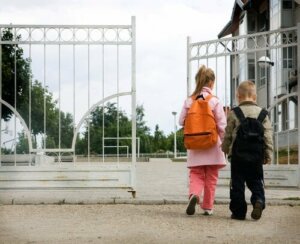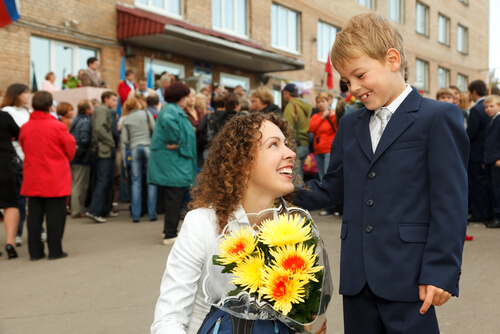8 Mistakes Parents Make On the First Days of School

The first days of school are a very important transition process for children. And the same is true for parents, as it means a change in routine, a new space, new people, and, in most cases, new teachers.
It is normal for parents to make certain mistakes during the first days of school because it’s a difficult time for them too. Afterall, their child will be outside of their protection and under the responsibility of strangers.
For this reason, it’s very common for them to spend the day wondering what their children are doing? Have they eaten? How are they feeling? Are they making friends? This isn’t so bad, unless we’re motivated to act and end up doing the wrong thing.
Below, we’re going to look at what the most common mistakes that parents make on the first days of school:
The most common mistakes parents make on the first days of school

- Losing control in front of the child. In many cases, parents tend to express their feelings in front of their children. That is, they burst into tears because of the terrible feeling of leaving them alone for the first time. This is a mistake because what they do is transmit their anguish to the child and predispose them to the same situation.
- Not talking to them about the things they’ll come across on their first day. Parents will certainly not be able to guess all the situations that their child will experience. However, you can help them understand the things that might occur during your first days, giving them a general idea. In this way, the child won’t feel alone during this transition.
- Visiting them at school. It’s very common for parents to be carried away by the temptation to visit their child at school, curious to see how they’re doing. However, the only thing you’ll do is cause your child to remember how upset they were. They’ll relive the episode that occurred earlier on because what they want is to go with Mom and Dad.
- Returning to say goodbye. In many cases, when a child is throwing a tantrum, the parents come back to say goodbye to them one more time. That’s a big mistake because they’re only encouraging this behavior.
- Sneaking out and not saying goodbye. Avoiding saying goodbye is also a mistake; It’s very common for parents to ask caregivers to distract the child so they can sneak out. However, not saying goodbye is a serious mistake because. The child may come to believe that their parents have abandoned them and there’s no need to put them through that. It’s better to say goodbye with a kiss and a hug. Let them know that you’ll come back for them in a few hours, that you love them, and everything will be fine.

More mistakes parents make on the first days of school
- Extending the farewell. The farewell should last a reasonable amount of time. Don’t make it too short, but don’t make it eternal either. Parents should be firm, do what we’ve recommended, and walk away without looking back. You should be able to convey some reassurance to your child some so they can see that it’s a normal life process.
- Physical abuse or scolding. Under no circumstances should you mistreat your child in order to keep them calm. Such action, apart from being child abuse and punishable by law, will only reinforce negative attitudes in your little one.
- Thinking that the child will adapt on the first day. There are cases where children make great progress on the first day of school. However, it doesn’t happen with every child because there are some who find it much more difficult to adapt. That’s why they require the constant support and understanding of their parents.
Conclusion
Parents must remember that, normally, their discomfort will last for some time until they adjust. In other words, you don’t need to worry too much, as children at the school have the help of qualified personnel to handle such situations.
It’s important that parents understand that the first days of school don’t need to be chaotic, nor is leaving the child there for a few hours the end of the world. It’s advisable to take things slowly and understand that the adaptation of the child is a whole process and requires your full support. As adults, we can understand things better than our children.
Parents should monitor their child’s adaptation process, to avoid losing patience and to serve as a guide to help them navigate the difficult path that this age requires walking down.
The first days of school are a very important transition process for children. And the same is true for parents, as it means a change in routine, a new space, new people, and, in most cases, new teachers.
It is normal for parents to make certain mistakes during the first days of school because it’s a difficult time for them too. Afterall, their child will be outside of their protection and under the responsibility of strangers.
For this reason, it’s very common for them to spend the day wondering what their children are doing? Have they eaten? How are they feeling? Are they making friends? This isn’t so bad, unless we’re motivated to act and end up doing the wrong thing.
Below, we’re going to look at what the most common mistakes that parents make on the first days of school:
The most common mistakes parents make on the first days of school

- Losing control in front of the child. In many cases, parents tend to express their feelings in front of their children. That is, they burst into tears because of the terrible feeling of leaving them alone for the first time. This is a mistake because what they do is transmit their anguish to the child and predispose them to the same situation.
- Not talking to them about the things they’ll come across on their first day. Parents will certainly not be able to guess all the situations that their child will experience. However, you can help them understand the things that might occur during your first days, giving them a general idea. In this way, the child won’t feel alone during this transition.
- Visiting them at school. It’s very common for parents to be carried away by the temptation to visit their child at school, curious to see how they’re doing. However, the only thing you’ll do is cause your child to remember how upset they were. They’ll relive the episode that occurred earlier on because what they want is to go with Mom and Dad.
- Returning to say goodbye. In many cases, when a child is throwing a tantrum, the parents come back to say goodbye to them one more time. That’s a big mistake because they’re only encouraging this behavior.
- Sneaking out and not saying goodbye. Avoiding saying goodbye is also a mistake; It’s very common for parents to ask caregivers to distract the child so they can sneak out. However, not saying goodbye is a serious mistake because. The child may come to believe that their parents have abandoned them and there’s no need to put them through that. It’s better to say goodbye with a kiss and a hug. Let them know that you’ll come back for them in a few hours, that you love them, and everything will be fine.

More mistakes parents make on the first days of school
- Extending the farewell. The farewell should last a reasonable amount of time. Don’t make it too short, but don’t make it eternal either. Parents should be firm, do what we’ve recommended, and walk away without looking back. You should be able to convey some reassurance to your child some so they can see that it’s a normal life process.
- Physical abuse or scolding. Under no circumstances should you mistreat your child in order to keep them calm. Such action, apart from being child abuse and punishable by law, will only reinforce negative attitudes in your little one.
- Thinking that the child will adapt on the first day. There are cases where children make great progress on the first day of school. However, it doesn’t happen with every child because there are some who find it much more difficult to adapt. That’s why they require the constant support and understanding of their parents.
Conclusion
Parents must remember that, normally, their discomfort will last for some time until they adjust. In other words, you don’t need to worry too much, as children at the school have the help of qualified personnel to handle such situations.
It’s important that parents understand that the first days of school don’t need to be chaotic, nor is leaving the child there for a few hours the end of the world. It’s advisable to take things slowly and understand that the adaptation of the child is a whole process and requires your full support. As adults, we can understand things better than our children.
Parents should monitor their child’s adaptation process, to avoid losing patience and to serve as a guide to help them navigate the difficult path that this age requires walking down.
All cited sources were thoroughly reviewed by our team to ensure their quality, reliability, currency, and validity. The bibliography of this article was considered reliable and of academic or scientific accuracy.
- Peralvarez, M. M. (2014). El apego y el periodo de adaptación en la escuela infantil. Revisado el, 12. https://www.orientacionandujar.es/wp-content/uploads/2014/08/El-apego-y-el-periodo-de-adaptación-en-la-escuela-infantil.pdf
- García Parra, C. L., & Marín Buitrago, K. Y. (2017). El primer día de clase: desconocido por el entorno, reconocido por el niño(Doctoral dissertation, Corporación Universitaria Minuto de Dios). https://repository.uniminuto.edu/bitstream/handle/10656/5919/TPED_GarciaParraCindyLaura_2017.pdf?sequence=1&isAllowed=y
- González, M. C. P. (2010). Los primeros días de clase en educación infantil. Pedagogía Magna, (9), 89-94. https://dialnet.unirioja.es/descarga/articulo/3628215.pdf
This text is provided for informational purposes only and does not replace consultation with a professional. If in doubt, consult your specialist.








